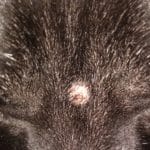I don’t believe so. As I understand it, syncope and fainting can be symptoms but are not the same as seizures.
My dog is13 1/2 years old. He is a dachshund/German Shepard mix. More dachshund. He has 5 fatty tumors that have all been biopsied and are not cancerous. They do seem to continue to grow in size. Not substantially but still grow. He had to go In for emergency surgery 2 years ago from cutting his artery in one of his paws during a walk. He has been a little different since then. More afraid of things. Urinates in the house every so often. I don’t know if it is from the surgery or just his age. But my question is whether or not I should have his Tumors removed with his age and how he responded to his last surgery. He is in very good health except for one health issue one time. A year ago he fell down and couldn’t walk. Took him to the vet. They kept him over night. They said it was old dogs disease. It went away 2 days later and hasn’t returned. Other than that he is very healthy. Gets his vaccines, heart worm, tick and flea meds. So do I remove them at his age or leave them alone. I keep debating this in my head and can’t make the call. I want what is best for him. I just don’t want to chance issues with going under anesthesia.
Any advice would be greatly appreciated. Thank you
Comments
Does congestive heart failure lead to seizures in dogs?
Comments
I noticed a raised lump on my Staffordshire bull terrier aged 8 on the 21st of November on my dog head that ulcerated the next day. The ulcerated lump scabed over then got knocked off the following week. I have been to 2 different vets within that time and both feel it either a histiocytoma or a mast cell tumour with both vets leaning toward it being a histiocytoma but only a biopsy will make sure. I have a biopsy for Wednesday but my question is would it be worth doing is this lump too close to the eyes for good margins? I have done days of googling and I see 1cm is all that needed for good margins and 90% of other sites saying 2-3cm is needed. I would not put my dog through radio therapy so if good margins is not possible would it be worth doing a biopsy? Another thing is I know it low chance but I don’t want to risk Anesthesia with my dog being that 1 in 2000 dog to die from it. Anyone know if good margins is possible from looking at the picture of my dog?
Comments
My 24 pound beagle, Shadow, jumped on the counter and stole a chocolate cupcake off of it. The recipe called for half a cup of cocoa powder and it made around 16 cupcakes (she only stole one).
Is this toxic and should I go to the vet immediately or is it only a certain amount of chocolate that would affect her?
Comments
Hello, I have a 2.5 year old desexed female cat and a 4-month-old male kitten. We moved house 4 months ago, and adopted the new kitten about 3 months ago. In our previous house, we used to let the older cat out during the day to roam the neighborhood, although she never went too far.
Since we’ve moved, we only let her out once or twice a week as there are a lot of cats here and she gets into more fights and has gotten injured once. She seems very stressed out, wanting to go out constantly.
We have tried everything to ease her stress: playing with her a lot, brushing and cuddling her daily, giving her a mix of wet and dry good food (that she likes), putting up Feliway diffuser around the house, and she plays with the kitten daily.
However, she still exhibits signs of stress, ie hiding, minor crouching, hissing or growling from time to time to us or the kitten, sleeps more, meows more, generally less affectionate towards us.
Do we have to let her go outside daily like before, so she can be less stressed, or is there any other way to lessen her stress? It has been 4 months and I am worried it will become chronic stress for her.
Comments
We believe our 3 year old French bulldog has IVDD related issue based on the exam at the emergency vet tonight.
We want to do everything we can as soon as we can. I spoke to a neurologist who said they won’t see him until he is referred by his primary vet. Just within the last 8 hours of this happening it appears he has loss all use of his hind legs. I’m not quite sure if this sign of paralysis or what I should be looking for. He is panting quite a bit from the pain so I’m assuming the paralysis hasn’t kicked in. We were given two prescriptions to follow through with until we can get him into a doctor on Monday. Is this going to be soon enough? We have pet insurance but also want to be sure it will cover the cost of the surgery if needed.
Comments
Hello! I just discovered this app via a YouTube video, as I now spend my days googling things like “Cat breathing loudly” and “normal cat breathing”…!
Since perhaps June I’ve noticed with increasing regularity my cat, Clover, breathing very loudly, sometimes to the point of waking me up with the sound. In September this progressed and my husband noticed her breathing freakishly fast and we rushed to a vet.
However 5 vets, including a specialist, many xrays, and treatment for gum disease later, no one seems to know what it is, and I can’t take the wait and see method they are prescribing. She is playing and eating and otherwise normal, but her breathing does seem to bother and annoy her and at times she looks very despondent.
The history is that almost two years ago I made the most terrible judgement call of my life and she got out the window of a new apartment and fell 4 floors. She was unable to use her back legs for a few days during which they kept her under observation and she needed stitches in her soft palate. She has made an almost complete recovery.
The accident happened exactly a week after our other cat contracted an unknown disease and died suddenly and shockingly at aged 5. I still haven’t recovered from our other cat’s passing and both my husband and I comfortably acknowledge that Clover is the number one love in my life, and I will do everything to keep her alive and happy. However we have reached our pet insurance limit and I am so concerned about what will be next.
I have done all of the internet researching there is to be done, and I just know looking at her and hearing her stressful breathing that something is very wrong. I don’t know if it’s connected to the fall, but it isn’t bronchitis or asthma both of which treatments did less than nothing.
If anyone has any advice or had a cat with similar symptoms please let me know what you think?!
Comments
I have a 14 month old pit mix that has terrible anxiety. He is terrified of being by himself, even if we are just behind the closed door using the bathroom. He cries terribly & will pace the house until we’re done. If I take a shower or bath I leave the door open so he feels a little better, but he then cries & tries to grab my arm to pull me out (not in an aggressive way). When people come into the house he paces, jumps, & whines for them. He also does this outside when he sees people or other dogs. He is told “down” when he jumps & warned with the beeping noise on his training collar. He will sit but it is very hard for him to stay still, as he continues to whine, shakes, & then rolls into the ground. It’s like he knows to listen & tries very hard but literally can not stay still. He also is terrified of thunder & the sound the trash truck makes. When those sounds are occurring he runs right under the table & won’t come out. We are in the process of training & we were told by them that they also think he has anxiety. They think he would be able to comprehend better if it was under control. I have been researching non stop for things to help with this major issue. I don’t want him on prescription anxiety meds that cause him to seem “sedated” & not like himself (that happened with my family dog). I have come across a tablet to help with separation anxiety & the behaviors that come with it. It is called clomicalm & every review or story I have read about it was positive. I really do think this could be a successful choice for him IF I know this is something that is not harmful. There are possible side effects that could occur but that could happen with pretty much any medication humans or pets. This tablet does not cause dogs to seem drowsy from what I’ve read from people’s experiences & has a high success rate to treat anxiety. We have tried natural treats, oils, thunder vests, etc. & nothing has helped him in the slightest bit. I just want to know if this something that would be okay for him to take daily or even okay to take at all?
Comments
My 18 month old pit mix woke up with this nodule type bump on her face. It was hard and crusty and now it’s open. I dint think it’s painful but she doesn’t like me to mess with it. I got the best pic I could. No other symptoms at all.
Comments
My question is about food for my cats and dogs.
Cats
Ive always been told to keep dry food out at all times so I do but I also feed them in the morning and at dinner with a mixture of wet and dry. They are all 6 years old and they are putting on weight. Should I take up the dry food so they don’t graze on it all day and just feed them their 2 meals a day. Is that enough?
Dogs
I have always fed my 13 year old once a day with a mixture of wet and dry and of course he gets tid bits from our plates through the day. Lol. He’s always been a healthy weight and seems very happy. I rescued a dog a year go that was a stray and she was 1. I kept dry food out for her all day, as suggested by my vet, and also feed her with her brother at diner time with the same mixture. I have recently taken up her dry food and only feed her once a day Now with the brother.
Am I doing the correct things for my animals. I don’t want to overindulge them and have them become overweight and have the many problems that come along with that. But i also don’t want them hungry. Not sure what to do.
Thanks










Hi there ???? I think I would chat with the vet at his next checkup and see what their thoughts are. There is always a risk with surgery, but if the pros outweigh the cons, then the answer is obvious. At this stage though, if your vet feels they aren’t a threat and you feel that the dog’s quality of life isn’t effected, then those would be strong factors in determining what the next step would be. You and your vet know your guy best, so that would be where I would start my discussion. Best of luck!!!
Hello,
I agree with Sarah. This needs to be a decision that you make with the help and guidance of the surgeon. You can get as many opinions as you need but they need tone from someone who can examine your dog. Find a vet (or two or more, or even a boarded surgeon) and ask for advice. Very best of luck.
I have consulted my vet and she told me it was my decision. The tumors are not in the way of his normal every day activity, Yet. I’m just afraid left unchecked they might become too large to handle. I just don’t know what the recommendations are for an almost 14 year old dog in regards to surgery. I know with every surgery there is a risk and I would assume his risk is greater than others due to his age. My gut tells me to remove them but will they just grow back? My heart tells me to leave them alone due to the fear of losing him under anesthesia. I’m absolutely torn.
Just thinking more about your situation…. wondering if you could just have it with your vet to have more frequent visits to check the tumors and make sure they aren’t growing or changing? That might help give you some peace of mind should you opt out of surgery.